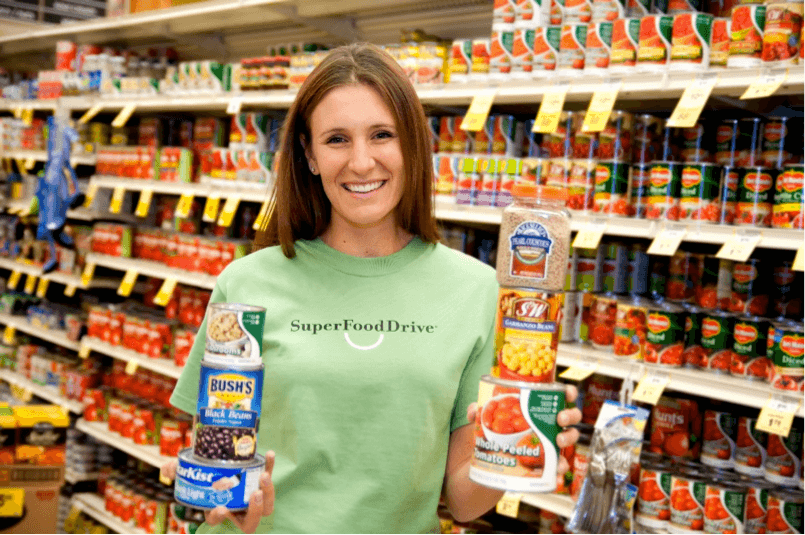Plant Chat: Ruthi Solari

I’m so excited to have Ruthi Solari on my blog today! Ruthi is a Clinical Nutritionist and has a Master’s degree in Mind Body Medicine and Integrative Health Care Systems. Her professional experience includes nutrition and healthy lifestyle coaching, group leadership and facilitation and program management in the field of corporate wellness. Most recently, Ruthi worked for San Diego’s Public Health Department as a nutrition program specialist to develop and implement the county’s first SNAP-Ed (food stamps) nutrition education program. Ruthi also founded SuperFood Drive in order to ensure that nutrient dense SuperFoods are accessible to all individuals, regardless of income level.
What made you interested in starting SuperFood Drive?
As a nutritionist, I know how important it is for our bodies and minds to have good nourishment in the form of healthy food and adequate nutrients. When I learned of the huge number of people (almost 50 million Americans) who struggle with food security and regularly go without meals or rely on packages of processed junk, I knew we needed to make some systemic changes. To me, it was a no-brainer: let’s support existing hunger relief organizations (food banks and food pantries) with collecting and distributing healthier food and nutrition education. We focus on small changes, such as eating brown rice instead of white, black beans instead of refried in lard, or fruit canned in its own juice instead of high fructose corn syrup. These seemingly small changes make a big difference in the health of the individual. We look at our work as an issue of social justice: ensuring all people have access to food that is life giving and not disease promoting. Our vision is to transform local food drives, national food banks and global humanitarian aid into providers of nutrient dense non-perishable foods. We believe that it’s not enough to fill empty stomachs with whatever food is available. The opposite of hungry isn’t full; it’s healthy!
As a dietitian for SuperFood Drive, what does your job entail?
As a nutritionist, I support SuperFood Drive’s mission in creating many of our educational materials to help engage donors in selecting healthier foods for their own pantries and the pantries of those in need. I regularly speak publicly about food as medicine and why a healthy pantry is the foundation of a healthy life.
How does SuperFood Drive help people gain access to healthy foods?
SuperFood Drive works with partner organizations to educate the community about the health benefits of eating nutrient-dense super foods and to ensure the accessibility of healthy food to all people, especially those in need. To do this, we support hunger relief organizations (food banks and food pantries) with collecting & distributing healthier foods (and nutrition education) to the clients they serve. One way we help bring in more healthy food is by organizing healthy food drives across the country; instead of reaching to the back of pantries for items that are unused and unwanted, SuperFood Drive encourages hosting a healthy food drive to collect affordable, nutritious non-perishables that are easily made into nourishing meals. We work with individuals, businesses, schools and grocery stores and help them plan effective, successful food drives to benefit their local community. You can access our free “healthy food drive tool kit” materials on our website.
How does your company raise awareness about the importance of nutrition?
The importance of good nutrition is at the core of everything we do at SuperFood Drive. There is a paradoxical correlation in the U.S. between hunger (food insecurity) and obesity. People are overweight and unhealthy, and yet struggling to get food on the table. Studies show that individuals who are dependent on food pantries are also more likely to be diagnosed with chronic, diet-related diseases such as obesity and type II diabetes. We know that the food we put in our bodies either promotes health or promotes disease; this is why it is so important to ensure that the food being distributed to individuals and families in need are foods that promote health. We also offer nutrition education through our youth program: SuperKids for SuperFoods. This service learning curriculum engages youth as leaders in addressing the correlated issues of hunger and disease.
What is your personal nutrition philosophy?
My personal nutrition philosophy is very similar to Michael Pollan’s recommendation in his book, Food Rules:
“Eat real food, mostly plants, not too much”
I stick to a whole foods, mainly plant-based diet and I feel wonderful! This is also the healthiest, most sustainable way to eat for the entire planet. So our goal is that all food pantries and food banks are able to distribute whole, plant-based foods to nourish our neighbors in need.
Name five foods you can’t live without.
Quinoa (great for breakfast or dinner), garbanzo beans (perfect to add to a salad or whip into hummus), walnuts (amazing to add to any meal and for snacking), dried blueberries (super source of antioxidants), and dark chocolate (at least 70% cocoa).


